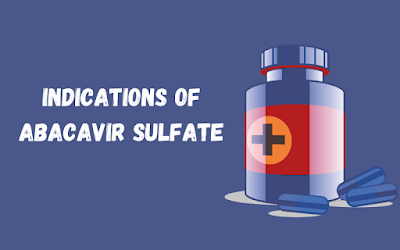Abacavir, a nucleoside analog reverse-transcriptase inhibitor (NRTIs), is indicated in antiretroviral combination therapy for the treatment of Human Immunodeficiency Virus (HIV) infection in adults, adolescents, and children.
The demonstration of the advantages of this drug mainly depends upon the outcomes of such studies which performed with a twice daily regimen, in treatment-naïve adult patients on combination therapy.
Before initiating treatment with abacavir sulfate, screening for carriage of the HLA-B*5701 allele (which is associated with drug-induced inflammatory disease of the skin) should be performed in such patients who are with HIV-infection, irrespective of racial origin. Individuals with B57 are more sensitive to the drug abacavir and should not be used this medicine in patients known to carry the HLA-B*5701 allele.
This medication should be prescribed by physicians experienced in the management of HIV infection. Abacavir 300 mg can be taken with or without food.
The administration should be performed by taking an entire dose, the tablet should ideally be gulped without crushing.
Oral solution of this drug is existing for use in such children who are over 90 days of age and weighing less than 14 kg. It is basically recommended for those patients for whom the tablets are inappropriate.
Apart from this, for such patients who are not able to gulp tablets, the tablet can be crushed and added to a small amount of semi-solid liquid or food, all of which should be taken immediately.
How Does it Work:
Abacavir is an NRTI which is a potent selective inhibitor of Human Immunodeficiency Virus-1 (HIV-1) and Human Immunodeficiency Virus-2 (HIV-2). Abacavir mainly metabolised intracellularly to the active moiety, TP (carbovir 5’- triphosphate). In vitro observations have specified that its mechanism of action in relation to Human Immunodeficiency Virus is inhibition of the HIV reverse transcriptase enzyme, an event which demonstrates in chain termination as well as interruption of the viral replication cycle. The existing antiviral functions and activity of this medicine in cell culture was not antagonized when come with the NRTIS (nucleoside reverse transcriptase inhibitors) emtricitabine, didanosine, lamivudine, stavudine, zidovudine or tenofovir, the NNRTI (non-nucleoside reverse transcriptase inhibitor) nevirapine, or the PI (protease inhibitor) amprenavir.
Common Side Effects: The most common symptoms of Abacavir 300 mg are: Fever (high temperature) and skin rash.
Other common symptoms are nausea (feeling sick), vomiting (being sick), diarrhoea, abdominal (stomach) pain and severe tiredness.
Some other possible symptoms include Pains in the joints or muscles, swelling of the neck, shortness of breath, sore throat, cough, occasional headaches, inflammation of the eye (conjunctivitis), mouth ulcers, tingling or numbness of the hands or feet and low blood pressure.
.
Check detailed about side effects of Abacavir Sulfate

I was diagnosed as HEPATITIS B carrier in 2013 with fibrosis of the
ReplyDeleteliver already present. I started on antiviral medications which
reduced the viral load initially. After a couple of years the virus
became resistant. I started on HEPATITIS B Herbal treatment from
ULTIMATE LIFE CLINIC (www.ultimatelifeclinic.com) in March, 2020. Their
treatment totally reversed the virus. I did another blood test after
the 6 months long treatment and tested negative to the virus. Amazing
treatment! This treatment is a breakthrough for all HBV carriers.